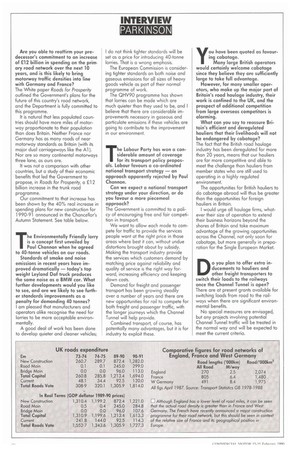Are you able to reaffirm your predecessor's commitment to an
Page 62

If you've noticed an error in this article please click here to report it so we can fix it.
increase of £12 billion in spending on the prim. ary road network over the next 10 years, and is this likely to bring motorway traffic densities into line with Germany and France?
The White paper Roads for Prosperity outlined the Government's plans for the future of this country's road network, and the Department is fully committed to this programme.
It is natural that less populated countries should have more miles of motorway proportionate to their population than does Britain. Neither France nor Germany has as many roads of near motorway standards as Britain (with its major dual carriageways like the Al). Nor are so many continental motorways three lane, as ours are.
It was not a comparison with other countries, but a study of their economic benefits that led the Government to propose, in Roads for Prosperity, a £12 billion increase in the trunk road programme.
Our commitment to that increase has been shown by the 40% real increase in spending plans for new construction for 1990-91 announced in the Chancellor's Autumn Statement. See table below.
The Environmentally Friendly lorry is a concept first unveiled by Paul Channon when he agreed to 40-tonne vehicles on our roads.
Standards of smoke and noise emissions in recent years have improved dramatically today's top weight Leyland Daf truck produces the same noise as a BMW car. What further developments would you like to see, and are we likely to see further standards improvements as a penalty for demanding 40 tonnes? I am pleased that manufacturers and operators alike recognise the need for lorries to be more acceptable environmentally.
A good deal of work has been done to develop quieter and cleaner vehicles;
I do not think tighter standards will be set as a price for introducing 40-tonne lorries. That is a wrong emphasis.
The European Commission is considering tighter standards on both noise and gaseous emissions for all sizes of heavy goods vehicle as part of their normal programme of work.
The QHV90 programme has shown that lorries can be made which are much quieter than they used to be, and believe that there are considerable improvements necessary in gaseous and particulate emissions if these vehicles are going to contribute to the improvement in our environment.
The Labour Party has won a considerable amount of coverage for its transport policy proposals. Labour favours a co-ordinated national transport strategy an approach apparently rejected by Paul Channon.
Can we expect a national transport strategy under your direction, or do you favour a more piecemeal approach?
The Government is committed to a policy of encouraging free and fair competition in transport.
We want to allow each mode to compete for traffic to provide the services people want at the right price in those areas where best it can, without undue distortions brought about by subsidy. Making the transport industry provide the services which customers demand by matching price against reliability and quality of service is the right way forward, increasing efficiency and keeping down costs.
Demand for freight and passenger transport has been growing steadily over a number of years and there are new opportunities for rail to compete for both freight and passenger traffic, with the longer journeys which the Channel Tunnel will help provide.
Combined transport, of course, has potentially many advantages, but it is for industry to exploit these.
you have been quoted as favouring cabotage.
Many large British operators would certainly welcome cabotage since they believe they are sufficiently large to take full advantage.
However, for many smaller operators, who make up the major part of Britain's road haulage industry, their work is confined to the UK, and the prospect of additional competition from large overseas competitors is alarming.
What can you say to reassure Britain's efficient and deregulated hauliers that their livelihoods will not be endangered by cabotage? The fact that the British road haulage industry has been deregulated for more than 20 years, means that our hauliers are for more competitive and able to meet the challenge than hauliers from member states who are still used io operating in a highly regulated environment.
The opportunities for British hauliers to do cabotage abroad will thus be greater than the opportunities for foreign hauliers in Britain.
I would urge all haulage firms, whatever their size of operation to extend their business horizons beyond the shores of Britain and take maximum advantage of the growing opportunities across the Channel, not only soon for cabotage, but more generally in preparation for the Single European Market.
Do you plan to offer extra inducements to hauliers and other freight transporters to switch their loads to the railways once the Channel Tunnel is open? There are at present grants available for switching loads from road to the railways when there are significant environmental benefits.
No special measures are envisaged, but any projects involving potential Channel Tunnel traffic will be treated in the normal way and will be expected to meet the current criteria.












































































































